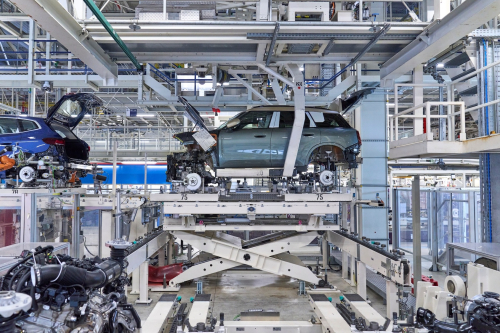
Over the last five years the BMW Group has invested €700 million to ready Leipzig for increased vehicle volumes and adapt it for MINI-specific requirements. By the end of 2024 the workforce in production will increase by more than 900. In addition, the new MINI Countryman is a catalyst for innovations in sustainable production.
By launching production of the MINI Countryman here in Leipzig, we are introducing multibrand operations to our flexible production system. Plant Leipzig also offers a number of highlights in terms of resource conservation in production, providing further evidence of the successful rollout of our long-term masterplan: the BMW iFACTORY.
—Milan Nedeljković, Board Member for Production
With its flexible assembly structures, Plant Leipzig is in a position to produce two brands with three different drives—combustion, plug-in-hybrid and fully electric—all on the same production line. The third-generation MINI Countryman will be available with a gasoline, diesel or fully electric powertrain, with the high-voltage batteries for the MINI Countryman Electric also being made in Leipzig. It will reach dealerships on 17 February 2024.
The BMW Group has invested some €500 million in Leipzig to increase production volume for new models. Since 2018 the bodyshop, paintshop, assembly and logistics have undergone extensive additions and upgrades, taking production capacity up from 250,000 units previously, to as much as 350,000 units a year at present.
To adapt the production system to MINI-specific requirements, the BMW Group invested around €200 million. Initially approximately 100 MINI Countryman cars a day will roll off the production lines, rising to 500 during the course of next year—in addition to the almost 1,000 BMW cars already coming out of the factory every day. This will not only secure existing jobs but also create up to 900 new ones in vehicle production alone.
Electromobility and MINI production drive development. Another important milestone in the development and extension of Plant Leipzig is its transition to electromobility.
Leipzig remains electric. With the BMW i3 and i8, we were at the vanguard of e-mobility at the BMW Group, and from 2024, we will be producing our next fully electric car: the MINI Countryman Electric. We will manufacture the high-voltage batteries for it in-house as well.
—Petra Peterhänsel, Plant Director
Starting next year BMW Group Plant Leipzig will run the entire production process for the current fifth generation of high-voltage batteries. This consists of three stages: cell coating, module production and battery assembly. The five cell coating lines, three module production lines and the first high-voltage battery assembly lines are all in the process of going into operation, with a second high-voltage battery assembly line scheduled for launch in 2024.
Capacity for e-component production has also been increasing, since 2021, making Plant Leipzig an important a supplier across the BMW production network. The parts are used in fully electric vehicles such as the BMW iX1, BMW i4, BMW i5 and BMW iX. E-component production in Leipzig currently employs over 800 people, and there are plans to develop it further, with investments totalling more than €800 million.
Sustainable materials and production. The MINI Countryman Electric is a major step in the MINI brand’s transition to full electrification by 2030 and combines an electrified go-kart feel with a reduced environmental footprint. In developing the new model, the MINI brand’s responsible attitude was very much in the focus with regard to materials and production: chrome no longer features anywhere in the interior or exterior, and the light-metal alloy wheels are cast from up to 70% secondary aluminum. The permanently electrically excited synchronous motors are highly efficient and made entirely without rare earth minerals.
The interior is made purely from innovative, high-quality materials that are easy on the environment. The dashboard, door facias, floor covering and foot mats, for example, are made of recycled textiles. A high-quality alternative to conventional materials such as plastics, recycled textiles reduce CO2 emissions along the value chain and require less water to manufacture.
Innovative painting method for contrast roof. One of the striking design features of the MINI exterior is the contrast roof, which can be ordered in a different color from the rest of the body. In the MINI Countryman it will be painted using a new, resource-friendly method known as overspray-free painting. Currently being readied for series operation, overspray-free painting does away with the excess paint—overspray—generated by conventional painting methods and makes surfaces with more than one color easier to produce, as they no longer require the laborious process of masking.
Overspray-free painting also helps save CO2 emissions, as exhaust air from the cabin requires less cleansing. Plus it requires considerably less conditioned air, i.e. air that is brought to a set temperature and humidity. As a result, less energy is needed to temper air and treat exhaust.